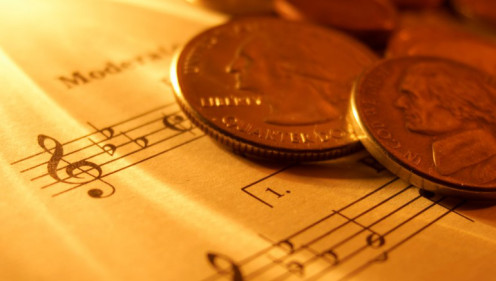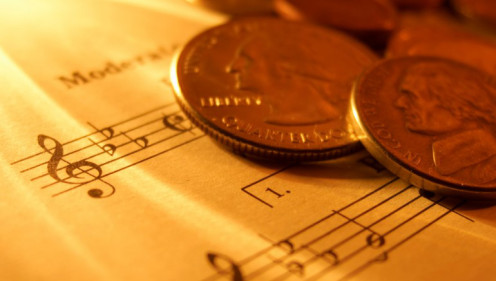So you’re new to the songwriting and music composition scene but you’re ready to not just get your feet wet but determined to take a plunge and take advantage of all of the opportunities available to you as a songwriter, especially when it comes to generating income from your songwriting and music compositions.
You know that some of the opportunities available to you include the use of your songs in movies, shopping your songs to record labels to provide to recording artistes and having your compositions in advertisements. From the little you know, a music publisher is usually the go between to link you to those opportunities.
But who is a music publisher anyway? What does one really do? Is a publishing deal right for you how do you know if you are signing the RIGHT music publishing deal? What are the basics you should know about a music publisher and what elements should you look out for when signing a publishing agreement? And in fact how do you get into contact with a music publisher anyway?
To start off, when you create a song (lyrics and melody) you are the owner of the song and therefore hold the musical copyright to this song. In the music industry, in order to generate revenue from your music works, the term exploitation is use. CD Baby explains that “exploiting a musical copyright” means that “the owner of a particular composition (the music and the lyric) is putting that song to use in a way that generated money in the form of performance royalties, mechanical royalties, licenses for synchronization, licences for sampling, and print rights for sheet music.”
Essentially when you decide to publish a song via a music publishing contract, you are assigning the rights of this song (for a period outlined in the agreement) to the music publisher, in exchange for that publisher actively exploiting your music works in order to generate new streams of revenue which you may not have access to. Generally publishing contracts specify that any revenue earned through the exploitation of the published music works is split 50/50 between the music publisher and the owner(s) of the songs.
Jeffrey Brabec and Tood Brabec, authors of “Music Money and Success: The Insider’s Guide to Making Money in the Music Business.” Brabec & Brabec (2011) offer an extensive list of responsibilities of a music publishers. These include: “
- “Copyrighting musical compositions, and making sure that the songs it represents are protected throughout the world.
- “Securing recording television, stage, ringtone, home video, and motion picture uses of song.
- “Arranging for the manufacture and distribution of sheet music, folios, songwriter compilations, internet, DVD, and CD packages and other music-oriented books.
- “Securing uses of songs in advertising commercials
- “Suing infringers of musical compositions and negotiating settlements when appropriate.
- “Properly registering songs with the songwriter’s respective performance collective rights association
- “Promoting the creation of new songs by helping to support and develop promising writers
- “Negotiating fees and issuing appropriate licenses for all uses of music”
While the above is not an extensive list of responsibilities of a music publisher, it is important to understand that not every music publishing contract will be the same, and therefore the responsibilities of the publisher may vary dependent on the terms of the contract. Music publishing contracts range from exclusive songwriter agreements, to non-exclusive songwriter agreements, to single song publishing agreements and co-publishing deals.
Further insight into the type of music publishing deals and what you should be on the look for when signing a music publishing deal will be provided in a subsequent post, so stay tuned to this official ECCO Blog.
Meanwhile, to address a query which I’m sure must be going around in your mind—how do you get in touch with a music publisher anyway?—allow me to share my own personal method and experience.
A few years ago, when I originally learnt about music publishing and decided to work on getting a publishing deal, I first zoned down on a geographic location where I wanted my music to gain increased exposure. After deciding on this location, I then conducted a few searches, using google search engine, for music publishers in that location who accepted unsolicited mail. [All of my research about how to get in contact with music publishers and any music industry professional for that matter, firmly caution against contact individuals who do not accept unsolicited mail. Nothing worse than being bombarded with requests when you aren’t looking. Right? So be mindful of that.]
After I had found this list and their corresponding email address, I conducted my own research into a few of the companies to see which I felt was a right fit for me. I paid particular attention to their track record over the years.
Once I had zoned down on the companies I wanted to contact, I sent out properly worded and structured emails, introducing myself, advising that I was interested in submitting music to them for consideration as part of their catalogue and providing links to where my music could be streamed—that’s another thing I’ve learnt over the year: never send attachments unless specifically asked to do so!
Bear in mind it was a tedious process but it was the best that I could do with the cards that I had been dealt. So if you are interested in becoming aligned with a music publisher, I hope my experience and method comes in handy to you.
References:
Jeffrey Brabec & Todd Brabec (2011). Music, Money and Success: The Insider’s Guide to Making Money in the Music Business.
CDBaby.com. What is Music Publishing. Retrieved from http://diymusician.cdbaby.com/musician-tips/what-is-music-publishing/
Photo Retrieved from: http://www.bmi.com/news/entry/how_to_start_your_own_music_publishing_company












Thank you! Your submission has been received!
Oops! Something went wrong while submitting the form